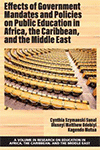
Effects of Government Mandates and Policies on Public Education in Africa, the Caribbean, and the Middle East
Edited by:
Cynthia S Sunal, University of Alabama
Oluseyi Matthew Odebiyi, Arizona State University
Kagendo Mutua, University of Alabama
A volume in the series: Research on Education in Africa, the Caribbean, and the Middle East. Editor(s): Cynthia S Sunal, University of Alabama. Oluseyi Matthew Odebiyi, Arizona State University. Kagendo Mutua, University of Alabama.
Published 2022
As the demand for education at all levels has increased, so have the models of meeting these increased demands for education. As in many other parts of the world, public education has expanded to serve large populations across the regions of Africa, the Caribbean, and the Middle East. Many nations in these regions have instituted mandates, policies, and frameworks intended to simultaneously increase access to public education opportunities as well as improve the quality of education provided and to address a wide populace. Because the increase in educational demand has occurred at all levels, these efforts often address various levels of education from early childhood through primary schooling, junior secondary and secondary schooling and into tertiary education. Efforts also have been made to increase participation in education by marginalized and/or special populations. The range of efforts is large with some focusing on involving migrants/immigrants/refugees in primary education while others aim at opening up choices at the university level.
Recently, nations in the region have recognized the possibilities of digital learning (online learning) as cell phones and other widely used portable wireless devices have made it possible to sell the idea that one can learn from anywhere at any time. This widespread access to technology has made it possible for governments as well as private entities to expand learning opportunities even to populations previously unreached or to address difficult to reach sectors of the population. At the same time, the population itself has not only increased in numbers but in diversity. Maintaining quality through digital and other means of quick expansion of educational opportunities continues to be challenging if not problematic.
Effects of Government Mandates and Policies on Public Education in Africa, the Caribbean, and the Middle East is Book IX of the series, Research on Education in Africa, the Caribbean, and the Middle East. Chapters document, describe and/or raise critical issues and/or questions resulting from government policies, mandates and frameworks intended to make available public education to an ever-growing populace while at the same time being mindful of improving quality of education being availed to an increasingly diverse populace.
CONTENTS
How Have Government Policies and Mandates Affected Public Education in Africa, the Caribbean, and the Middle East? Oluseyi Matthew Odebiyi, Cynthia Szymanski Sunal, and Kagendo Mutua. How Learners Gained and Then Lost: The Importance of Sustaining Government Policies, Heather M. C. Dixon, Leticia F. Taimo, Margaret J. Roper, Katharine Tjasink, and Jennifer L. Bisgard. Examining the Impact of the Free Senior High School Policy in Ghana, Araba A. Z. Osei-Tutu, Ellen Mabel Osei-Tutu, and Kwaku O. A. Osei-Tutu. The Role of Inclusive Education in Addressing HIV and AIDS: Challenges and Successes, Fumane Portia Khanare and Brenda Louise Hammett Marina. Gaps in English Teacher Preparation and English-Only Curriculum Implementation in Malawi Schools, Immaculée Harushimana and Agness Chimangeni Chaliwa Hara. Dominant English-Centered Language Policies in Education Marginalize Ghanaian Languages and Literacies, Edwin Nii Bonney and Akua Campbell. Mandating Educational Technology Use Without Preparation: The Case of Kenyan Pre-Service Teachers, Newton Buliva. Nigerian Teachers’ Perceptions of Using Multiple Representations to Solve Mathematics Problems, Ann Kajander and Jimmy Avoseh. Exploring Ghanaian Primary Teachers’ Readiness for National Curricula and Pedagogical Reform, Dionne Cross Francis, Pavneet Kaur Bharaj, and Anna Hinden. Were Five Years Wasted? Exploring Rural Education in Trinidad and Tobago, Alicia F. Noreiga. Distilling Public Secondary Education for At-Risk Youth in Trinidad and Tobago, Patricia G. Sealy and Kathy Ann Hogan. School Consolidation Policy in the Kingdom of Saudi Arabia, Fouz Abuzaid. History Revised: Political Islam and Education in Iran, Khodadad (Khodi) Kaviani. Human Rights and Women with Disabilities in the State of Qatar, Asma Abdulla Al Attiyah and Elsayed Elshabrawi A. Hassanein. Epilogue, Anica Bowe. Biographies.
-
Paperback978-1-64802-926-4
Web price: $45.04 (Reg. 52.99)
-
Hardcover978-1-64802-927-1
Web price: $80.74 (Reg. 94.99)
- eBook978-1-64802-928-8

- EDU039000 - EDUCATION: Computers & Technology
- EDU034000 - EDUCATION: EDUCATIONAL POLICY & REFORM: General
- EDU054000 - EDUCATION: Urban
-
 Advances in Special Education Research and Praxis in Selected Countries of Africa, Caribbean and the Middle East
Advances in Special Education Research and Praxis in Selected Countries of Africa, Caribbean and the Middle East
-
 Crosscurrents and Crosscutting Themes
Crosscurrents and Crosscutting Themes
-
 Research on Education in Africa, the Caribbean, and the Middle East
An Historic Overview
Research on Education in Africa, the Caribbean, and the Middle East
An Historic Overview
-
 Research on the Influences of Educational Policy on Teaching and Learning
Research on the Influences of Educational Policy on Teaching and Learning
-
 The Enterprise of Education
The Enterprise of Education
-
 Transforming Public Education in Africa, the Caribbean, and the Middle East
Transforming Public Education in Africa, the Caribbean, and the Middle East
-
 Undertaking Educational Challenges in the 21st Century
Research from the Field
Undertaking Educational Challenges in the 21st Century
Research from the Field

